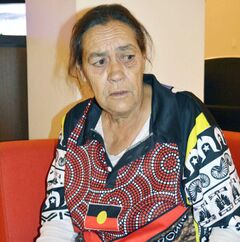Difference between revisions of "Sue Coleman-Haseldine"
(Inaugurating) |
(No difference)
|
Revision as of 21:11, 14 October 2021
(activist) | |
|---|---|
 | |
| Interests | Progressive International |
Sue Coleman-Haseldine is an activist and organiser from the Kokatha-Mula nation, an Aboriginal Australian people of the state of South Australia.
Contents
Survivor
Born in 1950 on the Aboriginal mission of Koonibba, she is a survivor of British nuclear weapons testing, and is the Australia ambassador of the International Campaign to Abolish Nuclear Weapons (ICAN), which was awarded the Nobel Peace Prize in 2017.[1]
Campaigner
On 4 December 2017, Australia's National Indigenous Television (NITV) reported:
Sue Coleman-Haseldine was a toddler crawling around in the dirt when the winds brought the black mist. Her white nappies on the washing line were burnt.
It was in the 1950s when the British began testing nuclear weapons at Maralinga in the South Australian outback.
The legacy of the bombs dropped continues to haunt the 67-year-old Aboriginal grandmother.
"We weren't on ground zero at Maralinga, otherwise we would all be dead," she told AAP.
"I was born and grew up on a mission at Koonibba, but the winds came to us."
Ceduna, the main township before the Nullarbor, is the cancer capital of Australia, Ms Coleman-Haseldine says.
She's had her thyroid removed and will be on medication for the rest of her life. Her 15-year-old granddaughter is also battling thyroid cancer. There are birth defects and cancers right across the community.
"It's changed our genes," she said. "These diseases weren't around before the bombs."
On December 10, Ms Coleman-Haseldine will be in Oslo for the Nobel Peace Prize award ceremony, where the International Campaign to Abolish Nuclear Weapons (ICAN) is being recognised for its work to achieve a treaty-based ban on nuclear weapons.
ICAN, an alliance of non-government organisations that strongly advocate for an international nuclear weapon ban treaty, have collaborated with Aboriginal survivors of the Maralinga nuclear tests in South Australia, to raise awareness of the dangers of nuclear weapons.
"The experience of Indigenous survivors of nuclear testing in Australia and worldwide has played a crucial role in the campaign to ban and eliminate nuclear weapons", an ICAN spokesperson told NITV News at the time the Nobel Peace Prize win was announced.
"The testimonies of survivors and their descendants provide the frontline evidence for why these weapons of mass destruction have no legitimate role in our world."
So far, 122 countries have adopted the treaty, excluding Australia and countries with nuclear weapons - the US, UK, Russia, China, France, India, Pakistan, North Korea and Israel.
Only three countries have ratified the treaty and 50 are needed for it to become international law.
In Norway, Ms Coleman-Haseldine will tell the story of her people and their contaminated land.
"You've got to keep the past alive to protect the future," she said.
Ms Coleman-Haseldine hopes Australia will reverse its opposition and sign the treaty.
The Turnbull government has ruled that out but the Labor Party will debate the issue at its national conference next year.[2]
Progressive
Sue Coleman-Haseldine is a Council member of Progressive International, the international organisation uniting and mobilising progressive left-wing activists and organisations.